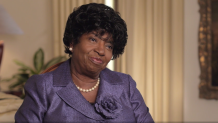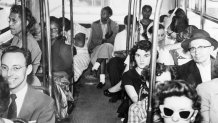For the entire month of February, NBC will showcase essays about Black Americans who pioneered change in United States history during the Civil Rights Movement that led to nationwide desegregation. Pioneers include those who led local efforts to desegregate schools, professionals who forged ahead to become luminaries within their industries, and advocates who stoked the wave of change head-on in the nation's bid for racial justice and equality.
Former Tennessee State Rep. Johnnie R. Turner

I already believed in equality of man, but I believed it's our responsibility to make it happen.
Johnnie R. Turner
In 2018, Johnnie R. Turner retired after serving eight years as State Representative for Tennessee’s 85th Congressional District. But decades before her rise to the Tennessee General Assembly, Turner found herself swept up in a rancorous struggle for civil rights in Memphis, fighting for a seat at the front of the bus.
A culture of racial discrimination entrenched the 1940s South, and Turner endured frequent acts of prejudice that would cast her as different and unwelcome, presenting an inferiority which, even at a young age, she was unwilling to accept.
Turner’s resilient spirit became more and more evident as she grew older. And with growing resilience came added frustration toward racial disparities in public places, and the exceptional humiliation she faced on public transit.
One day, as she sat with a friend on the bus, Turner resolved that she would refuse to forfeit her seat. She recalled: "as the bus got crowded [with white students], my girlfriend got up and moved to the back, and I looked out the window, because I just pretended I didn’t see them. And she came up and touched me on my shoulders and she said, ‘Johnnie, if you don’t get up and move, that bus driver … number one: he’s going to call you everything but a child of God; number two: he’s going to call the police; number three: they’re going to take you.’"
Turner heeded her friend’s advice, but a sense of shame returned: "That was the longest walk of my life. … And what really added insult to injury was that the little white girls that took my seat were giggling because they knew I didn’t want to move back."
Turner learned from the experience and years later, she was further tested while trying to balance collegiate studies, and travel home safely.
Recalling the long hours she spent at the library studying, trying to maintain her scholarship, Turner knew that riding alone on bus No. 9 after hours meant a dangerous proposition for a young Black girl in 1960s Memphis.
"There would only be white men left on that bus. They had cursed me out, they would spit on me, and on two occasions, they tried to pry my hands off of the post that I was holding, and almost pulled my arm out of the socket.
"I’d be so afraid, my knees would be hitting together, and I would cross my legs because I didn’t want them to know I was afraid. And, I could see the frustration on their faces. I could see how upset they were because I never showed any expression. ...
"They couldn’t crack me. I just prayed. I said, ‘Lord, please, please don’t let me show how afraid I am.’ ... I could have caught an earlier bus, but I refused to do so. I had the right to ride this bus, just like anybody else."
Bus integration was ordered by the Supreme Court in Browder v. Gayle and Boynton v. Virginia. Widespread opposition and a lack of enforcement, however, effectively sustained segregated seating arrangements on many public buses — meaning that Turner fought for a right each day that had already been granted her.

Perhaps most poignant of all is that Turner suffered in silence. She never revealed her bus experiences to her parents, particularly cognizant that her mother was fighting her own battles working as a maid.
"I never told anybody. I just figured that was my cross to bear. ... I said then, ‘if I could take this, I could take anything. I could handle everything.’"
A determined Turner would complete her university studies and become a Memphis schoolteacher, where she unlocked doors and inspired young people striving for a quality education. In 1996, she became Executive Director of Memphis’ NAACP branch, and championed economic growth in communities of color for over a decade.
Finally, after the 2009 passing of her husband, the late Tennessee State Rep. Larry Turner, Johnnie Turner sought and secured his vacant seat in the legislature. Her civic work was motivated by her very first encounters with discrimination as a child. For eight years, Turner fought to bring everyone a few steps closer to the front row.
"I am going to speak up for what I think is right,” Turner reflected. “Discrimination against anybody is wrong, because I know what it’s like to be discriminated against. I know what it’s like to be humiliated. I know what it’s like to be treated as a second-class citizen. … Making life better in terms of freedom, equality and justice for all has been my life’s story."
I know what it’s like to be discriminated against. I know what it’s like to be humiliated. I know what it’s like to be treated as a second-class citizen […] Making life better in terms of freedom, equality and justice for all has been my life’s story."
Former State Rep. Johnnie R. Turner
Comcast NBCUniversal’s Voices of the Civil Rights Movement platform honors the legacy and impact of America’s civil rights champions. Watch more than 17 hours of firsthand accounts and historical moments, online and on Xfinity On Demand.
Content owned and funded by Comcast NBCUniversal, parent company of this station.

